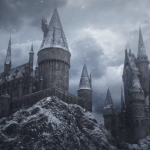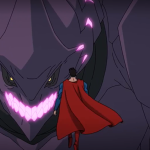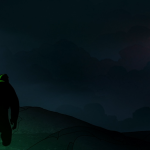Reviewing Queer Animated Characters With Trauma
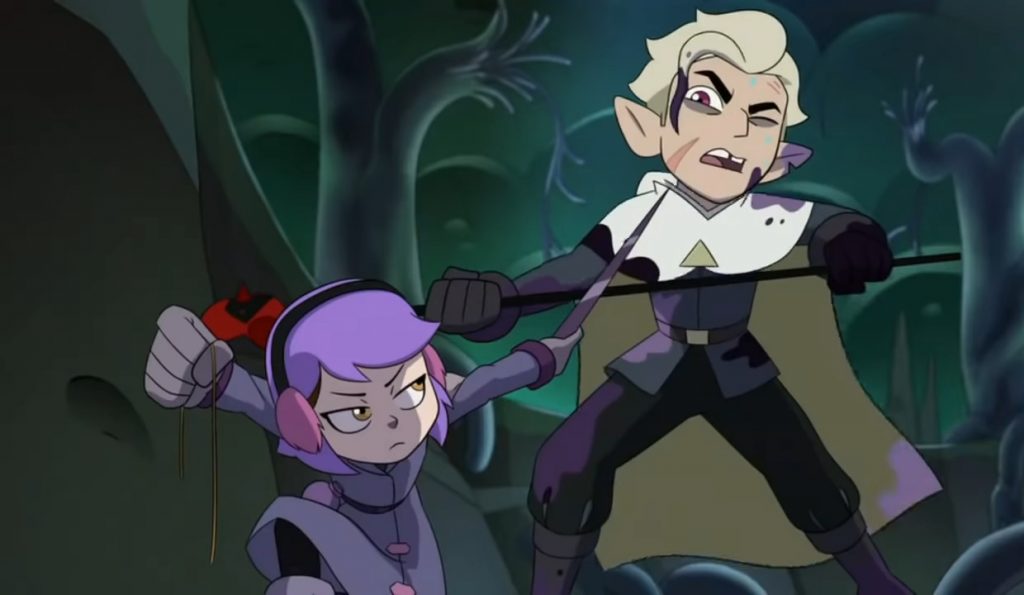
Recently, there has been a growing number of queer fictional animated characters with trauma. I decided to examine this trend and offer my thoughts.
Trauma is a common theme in fiction. This makes sense especially for conflict-prone series, either in live-action or animation. Recent years have made this even more pronounced as animation holds an “exceptional potential” to portray trauma, an emotional response to a distressing experience of some kind, unlike other mediums.
I’ll examine over 20 characters, who are either confirmed as part of the LGBTQ community or implied as such. The characters described in this article are only a small sample of a larger list of characters. I’ve only chosen characters in Western animated shows that I have watched to date, as a similar post on anime characters would be as long as this one.
This post contains spoilers for the series that I’m writing about. With that, let me get started!
The Owl House
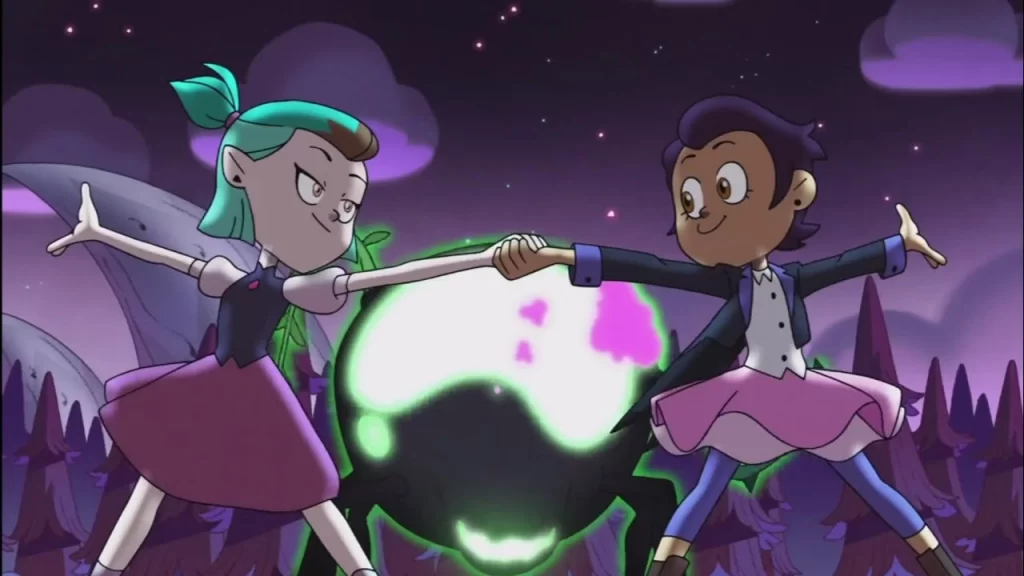
This fantasy and horror comedy animated series has trauma at its core. It emphasizes the importance of chosen family and discovering who you are as a person.
The show’s protagonist, Luz Noceda (Sarah Nicole-Robles) ends up into a magical world called the Boiling Isles. It is far away from her home and she soon has no way of returning. While she makes friends along the way, what happens to her is, at times, traumatic. In fact, one reviewer even stated that nearly every resident of the Owl House, including Eda Clawthorne (Wendie Malick), King (Alex Hirsch), and Luz, have post-traumatic stress disorder, commonly known as PTSD.
By the second season of the series, Luz has begun a romantic relationship with Amity Blight (Mae Whitman). Luz is confirmed as bisexual by the show’s creator, Dana Terrace, while Amity is a lesbian. Her voice actor is pansexual. Additionally, Eda is queer as she was in a relationship with Raine Whispers, a non-binary head witch of the Bard Covern. The voice actor of Raine, Avi Roque, is non-binary as well.
There’s also Eda’s sister, Lilith, who was recently implied as being asexual by her voice actor, Cissy Jones, the dads of Willow Park (Tati Gabrielle), Gilbert and Harvey, and the mysterious god-like creature named The Collector. The show’s creator may have implied the character is non-binary in a recent tweet.
All these characters, and every other character in the series, have trauma on some level. Even the series villain, Emperor Belos (Matthew Rhys), has a mind filled with decades of “triumph, trauma, and loss.”
Amphibia
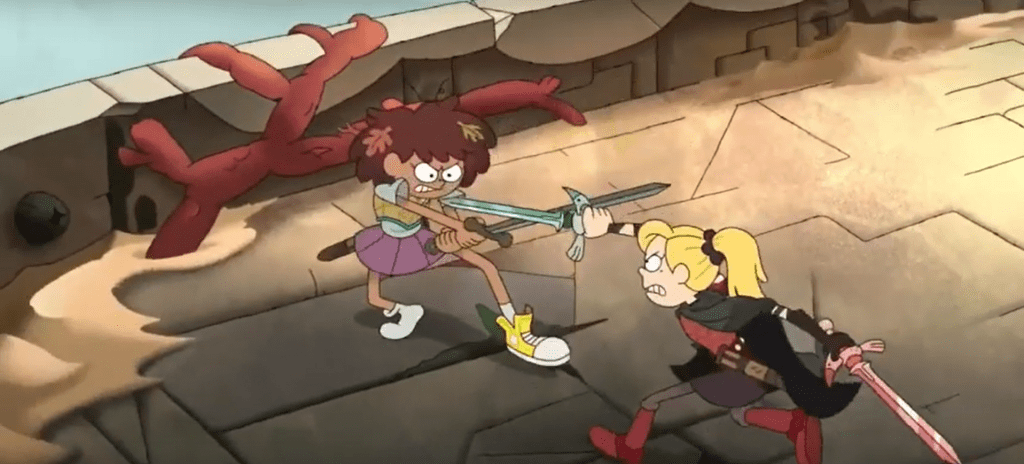
This recently-concluded series may seem harmless at first, but there is more below the surface. The three protagonists, Anne Boonchuy (Brenda Song), Marcy Wu (Haley Tju), and Sasha Waybright (Anna Akana) open a magic box. They end up in a wild tropical land known as Amphibia. Their friendship faces strains and hardships, including betrayals, pain, and death.
One of these characters is prominently part of the LGBTQ community: Sasha. Voiced by Akana, a talented voice actress, the show’s creator, Matt Braly confirmed her as bisexual after the show’s finale. This built upon a bisexual sticker on her car’s mirror in a final sequence. As it turns out, during an acceptance speech for the Streamy Awards she came out as bisexual, even though she was drunk when she made the speech since she didn’t expect to win the award.
Her character begins the series as a jerk, bully, and almost a villain of sorts. Sasha even fights the show’s protagonist, Anne, her high school friend, and butts heads with Marcy. She later works to make amends and fights King Andrias who has evil plans to take over the world.
Sasha joins other recurring LGBTQ characters, mostly in the show’s last season. This includes Frodrick Toadstool and Toadie who have a gay romance, confirmed by the show’s creator. Also, Yunan and Lady Olivia become a romantic lesbian couple, while Ally and Jess who run an Internet video channel together. It’s also implied that Mr. X, voiced by RuPaul, is gay.
All these characters have some level of trauma in one way or another. At the same time, the series serves as a “form of solace” and can ameliorate trauma often associated with media like The Owl House.
Disenchantment
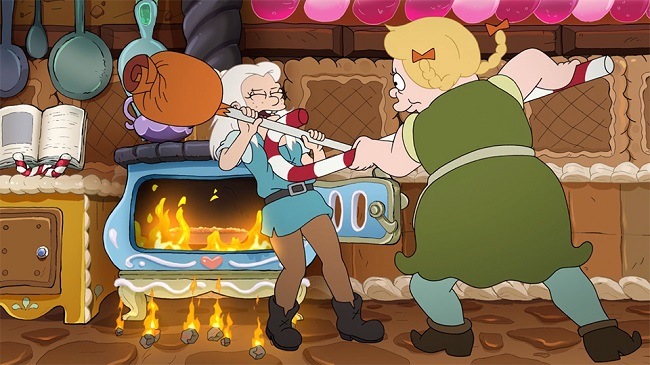
Although her father, Zog, works through his trauma in the most recent part of this mature animated series, Bean suffers from trauma as well. This is because events which involve a “serious threat to life…and feel beyond a person’s control” fill her life. Examples include loss of a parent, physical violence, sexual assault, military combat, or death of a loved one.
Through her role as princess, and then queen, these events include her father’s live burial, an elevator chopping off the head of her friend, and kidnapping of her friend Elfo. She isn’t alone with trauma, as her friends also have it as well, as do many other characters within this series. It shows that series is not afraid to tackle mental health as a theme.
In the most recent episodes of this series, she kisses a mermaid named Mora (Meredith Hagner). This romance and others with male characters, including Elfo, indicated she is bisexual or pansexual. She was directly confirmed as bisexual by an official Netflix account. Furthermore, Bean’s voice actress, Abbi Jacobson, is also bisexual.
There are other LGBTQ characters in this series, like Odval and Sorcerio. They are a gay couple who live in the Dreamland castle. It is further implied that Big Jo and Porky may have been in a toxic relationship with one another.
All of them experience physical violence, loss, and serious threats to their lives in more ways than one.
High Guardian Spice
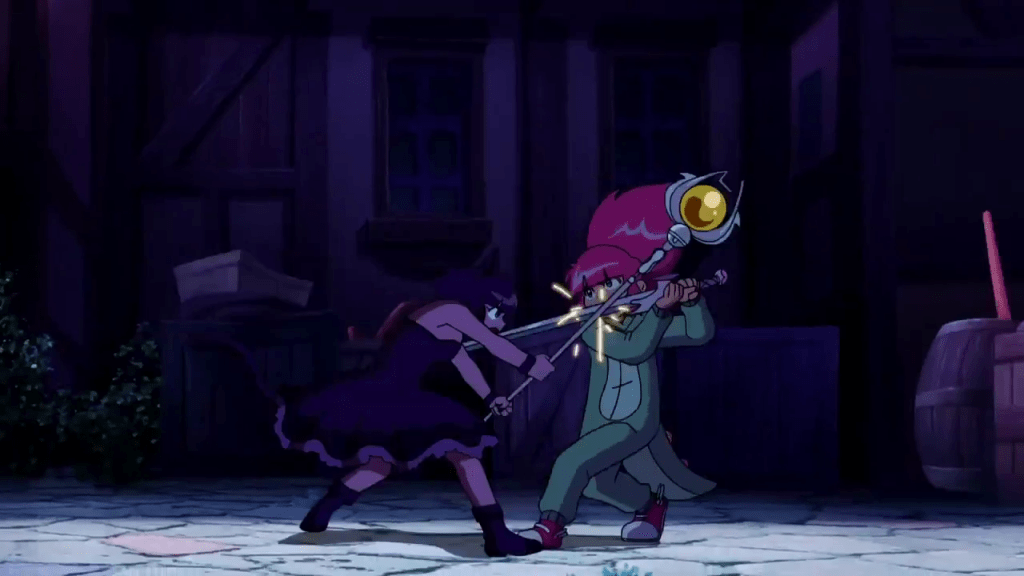
This series has major themes such as acceptance, togetherness, and discovering one’s identity. Rosemary (Briana Leon), has a recurring nightmare where her mother disappeared and left a magical sword behind. Unsurprisingly, she gets nervous when her locket, which has an important family memory, gets lost.
Rosemary isn’t alone. Sage (Lauren White) gets nervous when everything doesn’t go according to plan. She ends up questioning if she should be at the magic academy and what “right things” she should say to people. The latter is emblematic of her social awkwardness.
Both are implied as being in love with each other, in what some shippers call Sagemary. Since Rosemary shows an attraction to a male student in one episode, she could be bisexual. One of the show’s writers and voice actor of Amaryllis, Katie McVay, seemed to imply some the show’s characters are bisexual. Parsley (Amber Romero) and Thyme (Michelle Deco) might be lesbian characters. The latter has a crush on a mermaid named Coral in one episode.
Anise and Aloe are a lesbian couple. Haviland Stillwell, a lesbian actress, voices Anise. Then there’s Professor Caraway who reveals to Rosemary he is a trans man. The show’s creator, Raye Rodriguez, who is a Cuban trans man, voices him. Finally, the snarky student Snapdragon appears to be on the road to transitioning toward a trans woman. Julia Kaye, a comics writer and trans woman, voices her.
Traumatic events shape all these characters and many others. This includes queer-coded characters like the catgirl Olive (Stephanie Sheh), Slime Boy (Julian Koster), and professor Wyverna Dretch (Stillwell).
Legend of Korra
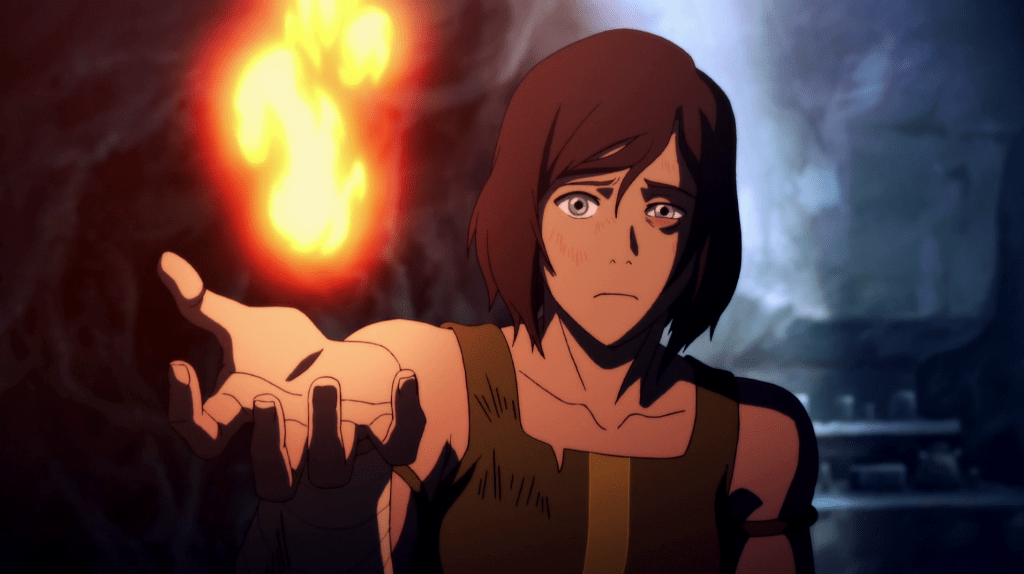
Trauma fills this classic, but divisive, anime-inspired series. Trauma affects two of the protagonists, Korra and Asami Sato.
Throughout the series, Korra becomes poisoned, physically traumatized, and emotionally scarred. This manifests itself in her losing her bending abilities and having her friends captured or maimed. Through it all she has to continue fighting as the Avatar, with a duty to keep the peace. One reviewer said that her PTSD storyline is sad, but also “so good”, as she survives through her drama which continues to inspire.
This contrasts with Asami. She loses almost everything in the series, from her imprisoned backstabbing father and almost losing her family company. One person argued that Asami’s trauma inspires her to “save others from feeling how she felt.” This includes Korra, who confides in Asami as she works through her trauma.
In the show’s final episode, and subsequently confirmed by show’s creators, Korra and Asami become a romantic couple. This was further shown in the graphic novel The Legend of Korra: Turf Wars. The same novel confirmed that Kya, daughter of Katara, is a lesbian. The novel also explores Kyoshi’s bisexual romantic feelings.
During the series, Korra and Asami date Mako, a male character, and are good friends with one another. With Korrisami confirmed, both are canonically bisexual.
Final Space
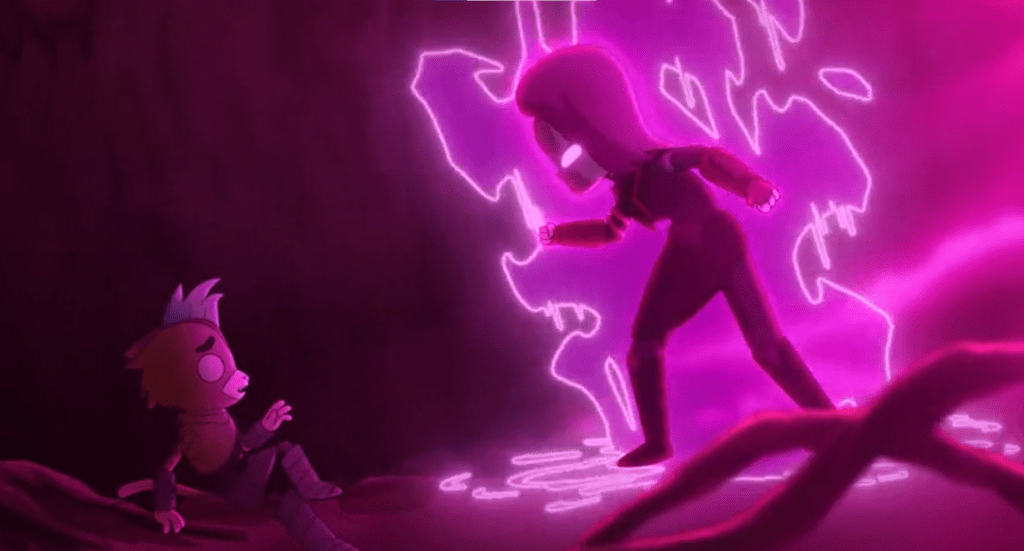
One of the protagonists of this cancelled mature animated series manifests trauma more than any other character. Ash Graven (Ashly Burch) is a complex character with a troubled past. Like other protagonists, the destruction of the Earth by the Lord Commander, and near-death experiences, traumatizes her.
Invictus, the show’s primary villain, exploits her trauma triggers to great effect. Similar to how triggers for people with PTSD manifest themselves, she lashes out, blames others unfairly, retreats, and her emotions flair.
Before this happens, she bonds with a genderless lifeform trapped in Final Space, named Evra (Jasmin Savoy Brown). Their growing relationship makes clear Ash’s romantic orientation as a lesbian. Since the show was not renewed, her relationship with Evra did not progress beyond one episode sequence.
Trauma and tragedy scar the memories and lives of every character in this series. This includes a recurring character named Clarence, confirmed by show creator Olan Rogers as bisexual, and Tribore Menendez, who may be genderfluid.
Just as literature can be a “valid resource” to learn about complex issues like trauma and mental health, with books even playing a role in recovering from mental illness, animated series can tackle the same topics. Final Space is one of those series.
Kipo and the Age of Wonderbeasts
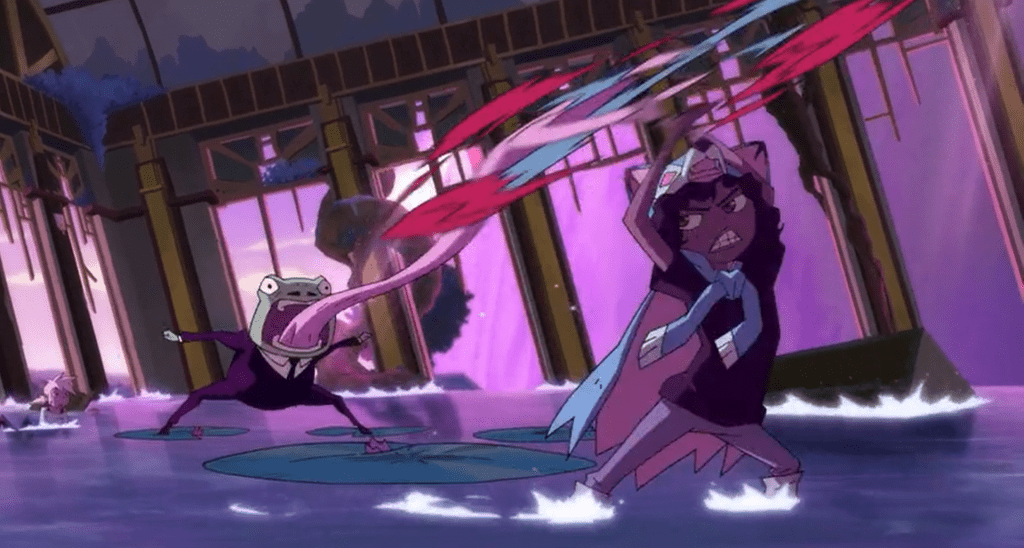
This young adult animated series is set in a post-apocalyptic wasteland known as Las Vistas, set in what is now Los Angeles. Animals have morphed into anthropomorphic characters and humans fled underground to burrows. The show’s protagonist, Kipo (Karen Fukuhara) is the series’ narrative center and a foil for the “world’s trauma and alienation.”
Kipo was never confirmed as part of the LGBTQ community. She is traumatized as much as any other character and with her troubled past. Some have headcanoned her as queer, but that is pure speculation.
The show’s creator, Radford “Rad” Sechrist said he never thought of Kipo as LGBTQ. She was recently confirmed as a Blasian character. It wasn’t directly stated in the series due to a worry by Sehcrist of “whitewashing and lightening black characters”. This led to a bit of a hullabaloo online after his clunky response.
She is not the only character who afflicted by trauma. For instance, there’s Benson Mekler (Coy Stewart) and Troy Sandoval (Giullian Yao Gioiello). Both later begin a romantic relationship. Sechrist hinted Troy as pansexual at one point. There’s additionally Asher Berdacs who is non-binary and voiced by River Butcher, a non-binary actor. Each of them has their own childhood traumas, as does Kipo’s friend, Wolf (Sydney Mikayla) and many other characters.
Even a mandrill named Scarlemagne (Dan Stevens), who wants to subjugate humanity, has deep-seated trauma. Any of his cruel acts are not justified by this, but they serve as a reason for what he did. While some object with his redemption of sorts, another villain is his abuser: Dr. Emilia (Amy Landecker), a manipulative and power-hungry scientist. Others have stated that her role as an abuser emphasizes the “potency of early trauma.”
Tangled
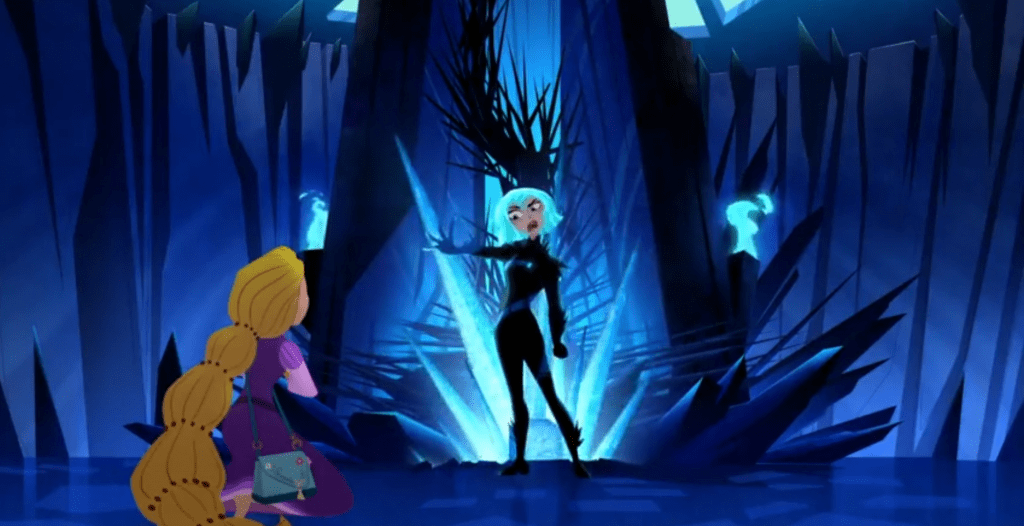
Rapunzel’s Tangled Adventure, called Tangled: The Series in the show’s first season, focuses on trauma. The 2010 animated film Tangled, which preceded the series, also explores trauma, toxic parentage, and emotional abuse. Others even employed the terrible tower where Rapunzel “Raps” lives, by force, as a metaphor for stages of abuse.
The series introduces Cassandra “Cass” (by Eden Espinosa), a complex character with trauma and PTSD. She sings about it, declaring she has nothing left to lose as she goes down a “path paved in black.” As acknowledged by storyboarder Amber Vanich, lesbian vibes were imbued in her drawings of Cass.
She has a troubled past like Raps. She has the same “mother”, causing the show to declare they were “sisters”. This couldn’t be further from the truth. Gothel, the birth mother of Cass, was Raps’ kidnapper, leading to irreparable trauma.
The evil Zhan Tri manipulates her, exploiting her trauma and plays on her triggers. As a result, she lashes out, blames Raps, and her emotions flair, especially when using moonstone powers to fight Raps, with sundrop powers. Often, Cass processes her thoughts and feelings about Raps, sometimes feeling that Raps is holding her back.
In the series finale, she helps Raps to defeat Zhan Tri and both reconcile. While Raps marries Eugene, her boyfriend since the series’ beginning, Cass and Raps declare their love for one other. This is presumably platonic as Disney wouldn’t allow it otherwise.
There is potential for a series spinoff of Cass, who departs on a journey at the series end, possibly to come to terms with her trauma and atone for her past misdeeds. Some fans have theorized a romantic ending for both characters, shipped as “Cassunzel,” say Raps is pansexual or bisexual, or otherwise embrace this ship.
She-Ra and the Princesses of Power
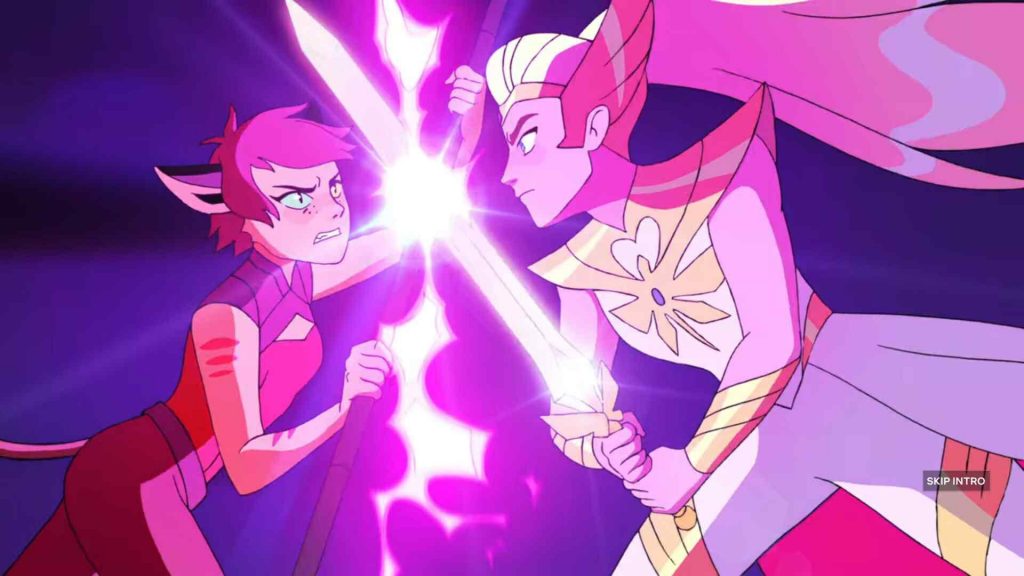
Trauma interlaces this now iconic series, a reboot of the 1980s Filmation animated series She-Ra: Princess of Power.
The series centers on Adora and Catra, voiced by Aimee Carrero and AJ Michalka. They begin as friends but continue to have complicated feelings as they are on different sides of the conflict. At the series’ end, their romantic relationship begins. They kiss and it saves the world from destruction, canonizing what fans dub “Catradora.”
Adora has a specific type of trauma. One reviewer described it as eco-trauma, saying that Adora suffers from treating ecological harm as a form of trauma, something which someone tries to repress to avoid its “painful effects.” This repression for Adora is external, as the First Ones impose it on her and attempt to turn the entire planet into a Death Star-like weapon.
Even so, it is through this planet she can access the memories of her predecessor. Light Hope (Morla Gorrondona), Adora’s AI guide of sorts, imposed a memory wipe to forget the previous She-Ra, Mara (Zehra Fazal). In the end, Adora doesn’t sacrifice her life, but Catra saves her, with both confessing their love for one another.
Trauma continues to follow Adora throughout the series, as she feels unworthy of doing “anything good.” In contrast, Catra appears self-assured on the surface, but she becomes plagued by her own doubt and guilt. This causes her to become controlling and aggressive, almost destroying the entire world at one point. More to the point, she spends a majority of the show as a broken and battered woman “defined by her trauma.” She makes decisions dictated by her experience with loss rather than from a place of love.
Adventure Time
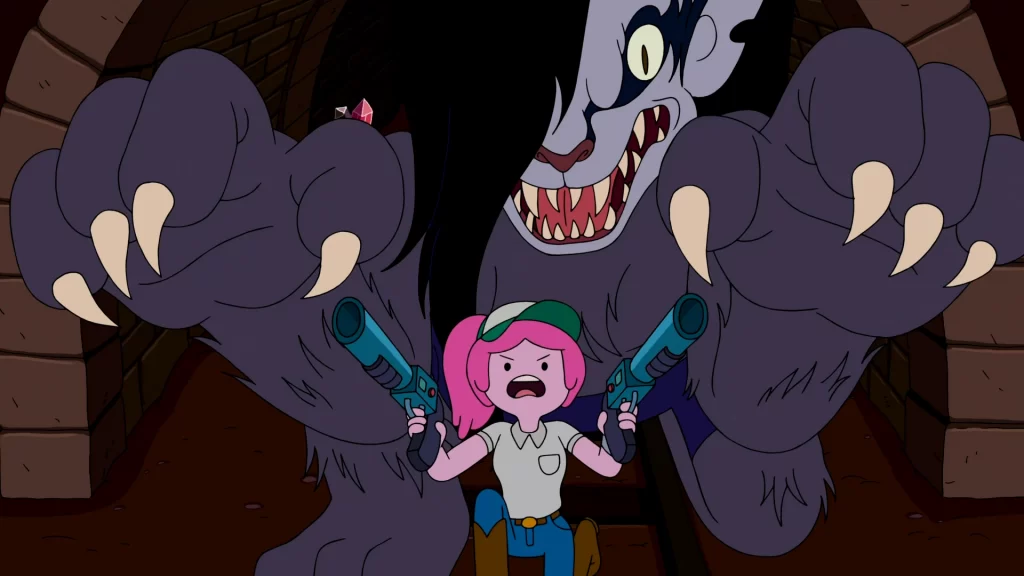
Marceline “Marcy” Abadeer is a fan-favorite vampire queen in this animated series. Marcy is more than a wacky character voiced by Olivia Olson. Instead she is a bisexual badass. Her character informed how then-storyboarder Rebecca Sugar told LGBTQ storylines in the future.
Marcy has a long and painful life, with her past trauma defining her. In fact, she becomes a vampire, or more exactly a half-demon, half-vampire multiracial woman in a traumatic way, becoming a source of her misery. She becomes stunted as an 18-year-old and never grows beyond that. Even so, she goes through an emotional journey of sorts, feeling like a monster.
This doesn’t happen on her own. She begins a romantic relationship with Princess Bonnibel “Bonnie” Bubblegum (Hynden Walch) in the series finale. The Adventure Time: Distant Lands episode “Obsidian” explores the relationship further. The episode was all the rage in fall 2020. Queer fans who love Bubbline (Bonnie and Marcy) were glad to see more of a focus on their relationship.
In that episode, Marcy grapples with her outer and inner demons, singing to Bonnie that she “always felt like a monster”. Bonnie comforts her while she has her own insecurities. They work through her struggles together while Bonnie has her own traumas born from her position as ruler of the Candy Kingdom.
This is not unique to her. Protagonists Finn and Jake, voiced by Jeremy Shada and John DiMaggio, are often thrown into conflict, either with the Lich, or other enemies. Even BMO (Niki Yang), who is a computer/video game console unit, who has no definite gender, becomes traumatized through the series. The Ice King (Tom Kenny), Huntress Wizard (Maria Bumford), Flame Princess ( Jessica DiCicco), and many others have trauma, too.
Star Trek: Lower Decks
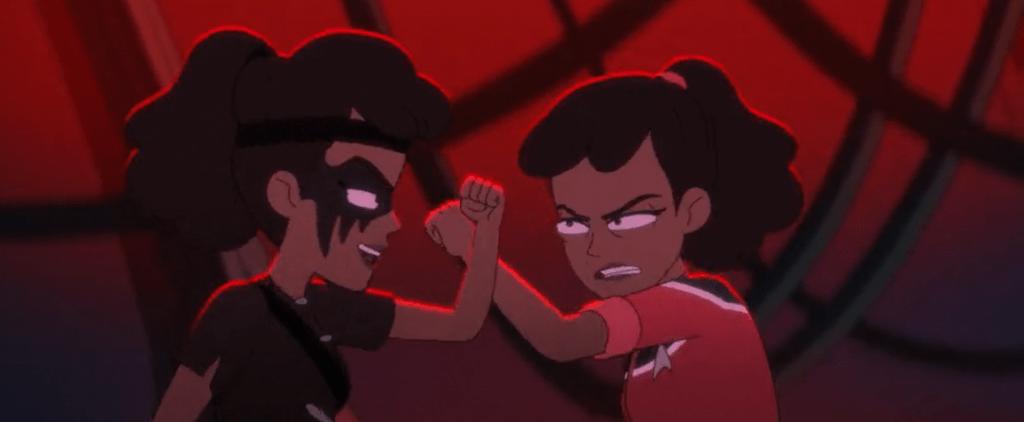
Beckett Mariner (Tawny Newsome) is a character in this mature sci-fi comedy series. She is a human and an ensign aboard a ship known as the USS Cerritos who likes to buck rules. This is in part because she is the daughter of the ship’s captain, Carol Freeman (Dawnn Lewis), even though she is very good at “all things Starfleet.”
Although some have argued that her trauma is sometimes played for laughs, the series still explains her motivations. Others have argued that the whole Starfleet crew needs therapy and better mental health care for everything they have gone through. One character, Shaxs (Fred Tatasciore), even dies at the end of one season to save Sam Rutherford (Eugene Cordero).
Mariner breaks protocol as a character, with the most recent season indicating she is bisexual or pansexual. At one point, the show’s creator, Mike McMahan, stated that Mariner’s former lover was Captain Amina Ramsey. He added that that “every Starfleet officer is probably at the baseline bisexual” in a sense.
She was also shown to have dated a man named Steve Levy. In one Season 2 episode she even declared that she had dated “bad boys, bad girls, bad gender non-binary babes, [and] ruthless alien masterminds” in the past. McMahan confirmed that Mariner will be dating a woman named Jennifer Sh’reyan (Lauren Lapkus) in the show’s next season.
Mariner is not the only character with traumatic experiences. The same is the case for the ship’s chief engineer, Andy Billups. He may be asexual, as he has no interest in having sex with male or female guards. Other characters are in thrown into conflict-prone situations as well, which are the breeding ground for trauma.
Arcane
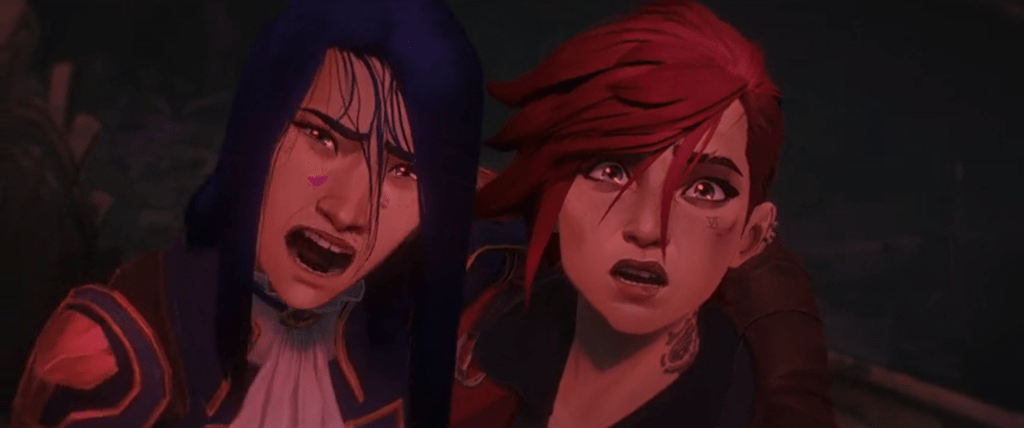
Trauma and tragedy fill this mature series. This is balanced with a tone not “too dour” and a plot that doesn’t drag the story down. This is a series with themes of class oppression taking place in a world with “no sexism, racism, or homophobia.” Human experimentation, acceptance, struggle, and family separation are important themes. There’s also depiction of attempted suicide, death, and kidnapping.
The adopted brother of Jinx (Ella Purnell), first known as Powder, taunts her, undermining her self-confidence. This combines with her fear of abandonment and guilt after some of her adopted family dies, causing her to become traumatized. She is still haunted by what happened in the past. Silco taps into these feelings, raising Jinx as her own. He doesn’t fault her for lashing when when triggered, even when it threatens his own operations.
She isn’t the only one affected by trauma. For Violet “Vi” (Hailee Steinfeld), this comes from her rough childhood living in the undercity, and separation from her sister, Jinx. For Caitlyn “Cait” Kiramman (Katie Leung), she has to deal with the pressure of working as an enforcer for the upper city of Piltover and new pressures of the undercity. This includes tense, stressful, and violent situations, especially with Vi.
Although some criticized its depiction, there is no doubt that in this series, Cait and Vi have romantic feelings for one another. It is what fans call “CaitVi,” “Violyn” or the official moniker, “Piltover’s Finest”, with over 10,000 subscribers to subreddits for the pairing. In the aftermath of the end of the last season, Vi and Cait will likely have to pick up the pieces after Jinx assassinated the council members of Piltover.
gen:LOCK
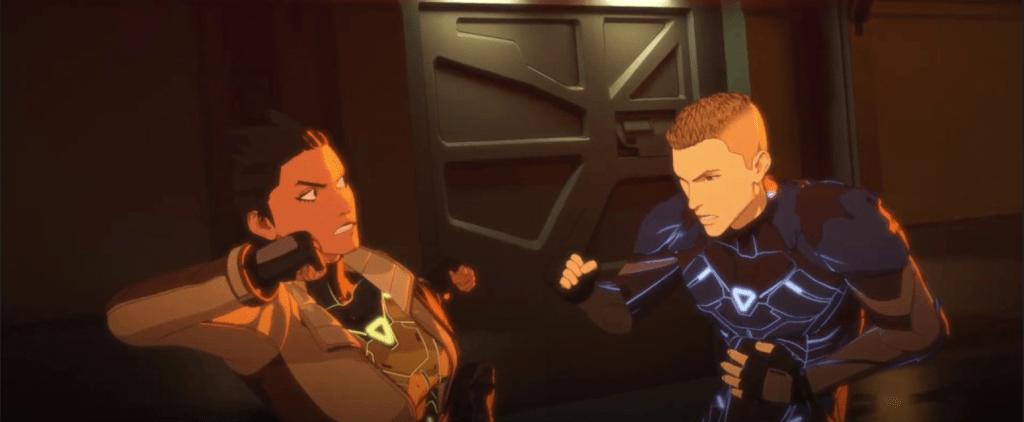
Like Arcane, this sci-fi mecha action series is mature and filled with sorrow. Due to a generally negative audience response and a subreddit which has turned against the show, renewal is unlikely. HBO Max and Rooster Teeth threw the show to the wolves. For all its faults, the series depicts trauma unlike any other, so it deserves a mention in this article.
Val/entina ‘Val’ Romanyszyn, who is a genderfluid and pansexual woman voiced by Asia Kate Dillon, goes through a lot in the series. The man she loves, Kazu Iida (Kōichi Yamadera), dies in front of her, and she watches countless others get injured or killed.
She is not alone in this. A demon named Nemesis, in the head of the show’s protagonist, Julian Chase (Michael B. Jordan) torments him throughout the series. It turns out that he is only a copy of his original self and the “demon” is another copy. Even so, he comes to terms with Nemesis and sees it as another part of himself.
Trauma and the subconscious are major themes in this series. Other members of Chase’s team, Cameron ‘Cammie’ MacCloud (Maisie Williams) and Yasamin ‘Yaz’ Madrani (Golshifteh Farahani) are also traumatized. Fighting the purportedly “evil” Union deeply affects Cammie, Yaz, Kazu, and Val, as does stresses from their lives before the war. The same is the case for Robert Sinclair, a fighter for the Polity and later a guerrilla. The show’s second season reveals that he has a boyfriend.
Some reviewers have stated that the series has “mental illness, trauma recovery, technological intimacy and identity” at its center. Others said that the series has characters with distinct personalities who have to tackle their own trauma.
Closing thoughts
There are many other examples of characters with trauma who are part of the LGBTQ community, such as Daisy in Magical Girl Friendship Squad, and Fry and Hamburg in Kid Cosmic to give two examples.
There are other characters who struggle with trauma, although it is harder to pin them into the LGBTQ community apart from headcanons. Take, for example, Beck in Tron:Uprising, Reagan Ridley in Inside Job, and Ron Stoppable in Kim Possible.
I would be remiss to not mention Steven Universe in the series of the same name. Due to his fighting against corrupted Gems and Gem warriors, he develops trauma. This is further explored in the limited 2019-2020 series, Steven Universe Future, which brings trauma to the forefront. He attempts to come to terms with and address the traumatic incidents which plague his mind.
In the end, more series with mature themes and LGBTQ characters suggests that characters racked with trauma are in the cards.
Author: Burkely Hermann
Burkely is an indexer of declassified documents by day and a fan fic writer by night. He recently earned a MLIS with a concentration in Digital Curation from the University of Maryland. He currently voraciously watches animated series and reads too many webcomics to count on Webtoon. He loves swimming, hiking, and searching his family roots in his spare time.
Help support independent journalism. Subscribe to our Patreon.
Copyright © The Geekiary
Do not copy our content in whole to other websites. If you are reading this anywhere besides TheGeekiary.com, it has been stolen.Read our

